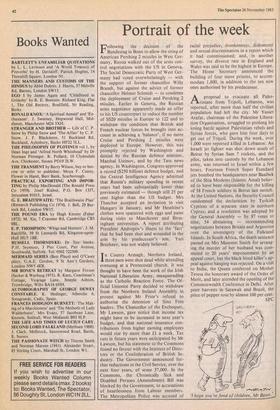Portrait of the week
Following the decision of the Bundestag in Bonn to allow the siting of American Pershing 2 missiles in West Ger- many, Russia walked out of the arms con- trol negotiations with the US in Geneva. The Social Democratic Party of West Ger- many had voted overwhelmingly — with the support of former chancellor Willy Brandt, but against the advice of former chancellor Helmut Schmidt — to condemn the deployment of Cruise and Pershing 2 missiles. Earlier in Geneva, the Russian arms negotiator apparently made an offer to his US counterpart to reduce the number of SS20 missiles in Europe to 122 and to withdraw the condition that British and French nuclear forces be brought into ac- count in achieving a 'balance', if no more Cruise and Pershing 2 missiles were deployed in Europe. However, this was promptly rejected by Washington and denied by the Russian defence minister, Marshal Ustinov, and by the Tass news agency. In Washington, Congress approved a record ($250 billion) defence budget, and the Central Intelligence Agency admitted that Russia's military spending in recent years had been substantially lower than previously estimated — though still 25 per cent higher than the US budget. Mrs Thatcher accepted an invitation to visit Hungary in January, and Mr Heseltine's clothes were spattered with eggs and paint during visits to Manchester and Birm- ingham universities. A report attributing President Andropov's illness to the 'fact' that he had been shot and wounded in the arm by his predecessor's son, Yuri Brezhnev, was not widely believed.
Tn County Armagh, Northern Ireland, 1 three men were shot dead while attending evensong at a Pentecostal church. It was thought to have been the work of the Irish National Liberation Army, masquerading as the Catholic Reaction Force. The Of- ficial Unionist Party decided to withdraw from the Northern Ireland Assembly in protest against Mr Prior's refusal to authorise the detention of Sinn Fein leaders. The Chancellor of the Exchequer, Mr Lawson, gave notice that income tax might have to be increased in next year's budget, and that national insurance con- tributions from higher earning employees would rise by more than £1 a week. Tax cuts in future years were anticipated by Mr Lawson, but his statement to the Commons found no favour with the Institute of Direc- tors or the Confederation of British In- dustry. The Government announced fur- ther reductions in the Civil Service, over the next four years, of some 37,000. In the Commons, the Chronically Sick and Disabled Persons (Amendment) Bill was blocked by the Government, to accusations of heartlessness from Labour members. The Metropolitan Police was accused of racial prejudice, drunkenness, dishonesty and sexual discrimination in a report which it had commissioned; and, in another survey, the divorce rate in England and Wales was said to be the highest in Europe. The Home Secretary announced the building of four more prisons, to accom- modate 1,800, in addition to the ten new ones authorised by his predecessor.
Aproposal to evacuate all Pales- tinians from Tripoli, Lebanon, was reported, after more than half the civilian population had left the city. Mr Yasser Arafat, chairman of the Palestine Libera- tion Organisation, struggled to prolong his losing battle against Palestinian rebels and Syrian forces, who gave him four days to get out of Tripoli. During the week, over 1,000 were reported killed in Lebanon. An Israeli jet fighter was shot down south of Beirut by Syrian Sam 7 rockets, and the pilot, taken into custody by the Lebanese army, was returned to Israel within a few hours. Fourteen French Super Etendard jets bombed the headquarters near Baalbek of the Shia Moslems (Islamic Amal) believ- ed to have been responsible for the killing of 58 French soldiers in Beirut last month. At the United Nations, the Security Council condemned the declaration by Turkish Cypriots of a separate state in northern Cyprus; and a resolution was adopted by the General Assembly — by 87 votes to nine, 54 abstaining — recommending negotiations between Britain and Argentina over the sovereignty of the Falkland Islands. In South Africa, the death sentence passed on Mrs Maureen Smith for arrang- ing the murder of her husband was com- muted to 20 years' imprisonment by an appeal court, but the black hired killer's ap- peal against hanging was rejected. On a visit to India, the Queen conferred on Mother Teresa the honorary award of the Order of Merit, and later attended the opening of the Commonwealth Conference in Delhi. After poor harvests in Sarawak and Brazil, the price of pepper rose by almost 100 per cent.
SPC 'I hope you're fond of children, Mr Bales.














































 Previous page
Previous page